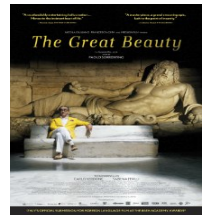ITALY CHEERS FOR OSCAR WIN
For the first time in 15 years, an Italian movie won the Academy Award for best foreign language film on March 2, 2014. The news that Paolo Sorrentino’s La Grande Bellezza (“The Great Beauty”) won an Oscar was reported with banner headlines in Italian news media, and was the top story on radio and television news, not to mention the buzz on social media. For example, a headline in one major newspaper read
“The Oscars, Italy’s Triumph: The Great Beauty wins as Sorrentino thanks Fellini and Maradonna,”
referring to Sorrentino’s comment that he was inspired by the famed director Federico Fellini, soccer great Diego Maradonna (who played for several years for the soccer club of Sorrentino’s home town squad Napoli), and Martin Scorsese.
The Academy Award is Italy’s 11th Oscar but its first in 15 years since Roberto Benigni’s La Vita è Bella (“Life Is Beautiful”) won. Italy has won more than any other country, with France coming in second with nine. The Great Beauty stars acclaimed actor Toni Servillo who portrays a celebrated writer who descends into Rome’s decadent party scene while battling a crippling case of writer’s block. Toni Servillo’s international breakthrough roles came in 2008 as Giulio Andreotti in “Il Divo” and as Roberto’s boss Franco in “Gomorrah.”
The actor, who has lived in Caserta for many years, has also directed famous theatrical operas at the Teatro San Carlo opera house in Naples. Toni was interviewed March 23 on RAI TV upon his return from Los Angeles, and he described his meeting with Italian President Giorgio Napolitano and how he and Paolo Sorrentino were warmly received by Hollywood directors and actors. (La Grande Belleza was shown at Casa Italiana on March 16).
After the Oscar win was announced, Rome Mayor Ignazio Marino began planning walkingtours designed to show off some of the beauty highlighted in the film. These tours around Rome began March 16 and stop at key scenes from the movie, including gardens, private buildings and historical sites. The three routes include spots not always open to the public as well as famous sights that are visited by Toni Servillo’s character.
The routes include Piazza Navona, the Church of St. Agnese in Agone, the Ponte Sisto across the Tiber River, the Aventine Hill, Baths of Caracalla, Capitoline Museums and the Colosseum. Looking ahead to next year’s Academy Awards, at least one movie reviewer predicts an Oscar winner may be a movie to be directed by Angelina Jolie, based on the life of Louis Zamperini, a World War II hero and former Olympic distance runner. Jolie has been on the talk show circuit explaining that her next movie project will be an adaptation of the book “Unbroken” by Lauren Hillenbrand’s bestseller on the life of Zamperini, who Jolie notes lives in her Los Angeles neighborhood.
Zamperini, who is now 97 years old, was born in upstate New York to Italian immigrants Anthony Zamperini and Louise Dossi. The family moved to Torrance, California in 1919.
Louis and his family spoke no English when they moved to California, which made him the target of bullies, and so his father taught him how to box in self-defense. 9 Louis had natural athletic ability and by 1934, he set a world interscholastic record for running the mile. He eventually won a place on the U.S.
Olympic team in the 5,000 meters, at 19 the youngest U.S. qualifier ever in that event. Zamperini’s performance during the 1936 Olympics in Berlin reportedly drew the attention of Adolph Hitler. In 1941, Zamperini enlisted in the U.S. Army and was commissioned as a second lieutenant. While on a routine reconnaisance flight, his aircraft crashed in the Pacific Ocean.
He survived 47 days in shark-infested waters until he was rescued by the Japanese, but his rescuers also became his torturers, and they put him in a series of brutal prison camps. Zamperini, who was at first declared missing at sea, returned home to a hero’s welcome. Years later, during the Winter Olympics in Nagano, Japan in 1998, Zamperini ran a leg in the Olympic torch relay at the age of 81.
In the invervening years, Zamperini had become a Christian inspirational speaker, and one of his favorite themes was “forgiveness.” Zamperini himself returned to visit the guards who had brutalized him during the war and expressed his forgiveness. In October 2008, Zamperini was inducted into the National Italian American Sports Hall of Fame in Chicago. This true-life story sounds like a winner, doesn’t it?



